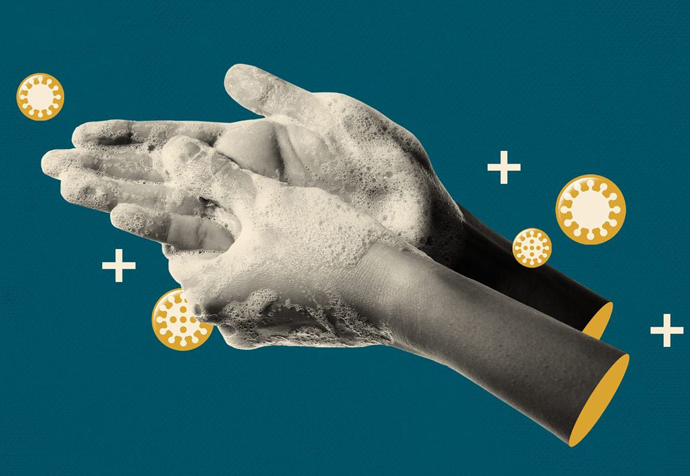-
How to choose an effective hand sanitizer
Coronavirus made me think of a hand sanitizer. I explain why you do not need to do a sanitizer with your own hands and where to buy an effective one.
 Before, i buy a hand sanitizer at the special stores, but every day they became less and less. Then the sanitizers disappeared and I began to look for Russian effective antiseptics.
Before, i buy a hand sanitizer at the special stores, but every day they became less and less. Then the sanitizers disappeared and I began to look for Russian effective antiseptics.Last week I was lucky, I bought napkins with 70% ethyl alcohol. They ended up on sale, so I’ll tell you what antiseptics work, whether it’s worth panicking and doing sanitizers with your own hands.
How to use sanitizers
FIRST TIME, WASH YOUR HANDS WITH SOAP . ″ The best way to clean your hands is to wash them with water and soap after the street, public places and toilets, ’said Fran Wallach, assistant professor of infectious diseases at Sinai University in New York.
WASH HANDS FOR AT LEAST 20 SECONDS . An interesting study was conducted at the University of Hospitality, Michigan, America. Scientists have found that only 5% of people wash their hands enough to kill germs, and about 10% do not wash their hands at all.
HAND SANITIZER helps cleanse hands of bacteria and viruses without the use of soap and water. Sanitizers can be in the form of a spray, gel or cleaning wipes. Wipes are the most versatile, they disinfect hands and remove mechanical dirt from the surface. Check the purell singles advanced hand sanitizer gel fragrance-free 9630-08-ec at the our website.
Which hand sanitizers are effective
CHOOSE A SANITIZER WITH ALCOHOL . Look for ethyl alcohol or isopropyl alcohol (at least 60%). Only alcohol has a pronounced property against viruses. To keep your hands dry less, choose formulations with moisturizers, glycerin and aloe vera gel.
HAND WIPES BETTER SPRAY . Alcohol kills most viruses, but the virus also requires mechanical action. Friction relieves the surface of the hands of particles of someone's saliva or sneeze mechanically.
IF YOU HAVE A SANITIZER SPRAY, SPRAY IT BETWEEN FINGERS. This advice is given by Fran Wallach when using an antiseptic - spray in sufficient quantity on the surface of the palms and between the fingers, air dry for at least 10 seconds.
What sanitizers should not be used
REFUSE Triclosan . Triclosan in hand sanitizers is prohibited in almost all countries except Russia. Triclosan destroys local skin immunity, contributes to the appearance of mutant viruses and antibiotic-resistant bacteria.
DO NOT USE TECHNICAL ALCOHOLS . Technical methyl alcohol (methanol) can be dangerous. Even if you only rub his hands, he can be absorbed through the skin.
DO NOT DO THE SANITIZER BY YOUR HANDS . There are many recipes for how to make a sanitizer with your own hands, but I do not recommend this. Such sanitizers will not provide the necessary protection, and a high concentration of essential oils can be dangerous even for ordinary people. And for children and allergy sufferers - even more so.
Where to buy hand sanitizer
CHOOSE A PRODUCT CONTAINING AT LEAST 60% OF ALCOHOL . Ethyl and isopropyl alcohol work effectively, with a content of 60% alcohol for treating hands and 70% alcohol for treating surfaces. Only such a sanitizer will be effective.
INJECTION WIPES . Contain 70% pure ethyl alcohol and are great for handling hands, keyboards, mobile phones, headphones and mice. After such wipes, apply a thick moisturizer on your hands to reduce dry skin.
BUY ALCOHOLIC ACID SOLUTION . It is suitable for processing leather and surfaces in the house. It is better to carry out the treatment with medical gloves in order to reduce the effect of alcohol on the skin of the hands.
CALENDULA TUNING . Another effective and cheaper tool that you can buy in a pharmacy. Tincture contains 70% pure ethyl alcohol, so it works great as a sanitizer.
How to behave in public toilets
DO NOT USE SOAP . Bar soap in public toilets accumulates bacteria on the surface, so it is less common than liquid.
BEWARE WITH LIQUID SOAP . Do not be surprised, but liquid soap in dispensers also contains bacteria! Remember that dispensers are not disposable. Workers pour soap into them, but don’t clean the dispensers that thousands of people touch daily. Through the dispenser, bacteria enter the liquid soap.
PROCESS HANDS . After a public toilet, wash your hands with water, treat with a sanitizer and close the tap with a paper towel.
-
Comments
